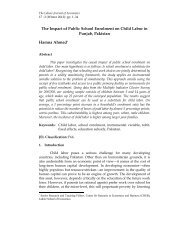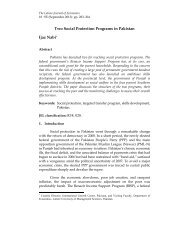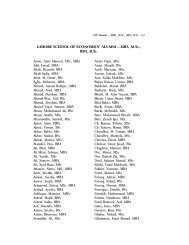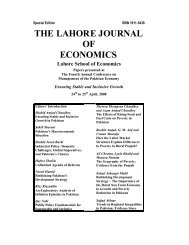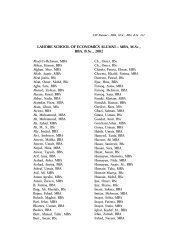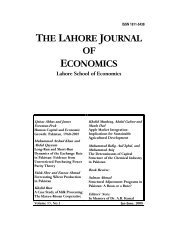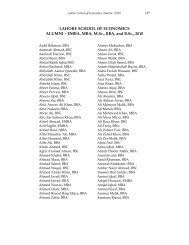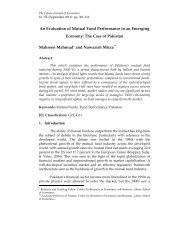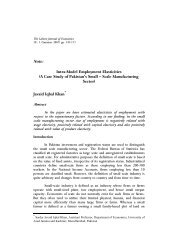Special Edition-07.pdf - Lahore School of Economics
Special Edition-07.pdf - Lahore School of Economics
Special Edition-07.pdf - Lahore School of Economics
You also want an ePaper? Increase the reach of your titles
YUMPU automatically turns print PDFs into web optimized ePapers that Google loves.
Monetary and Fiscal Policies 53<br />
The composition <strong>of</strong> public expenditure has also become unbalanced<br />
because <strong>of</strong> inflexible expenditure commitments. Resultantly, much <strong>of</strong> the<br />
fiscal space created by the recent rescheduling and re-pr<strong>of</strong>iling <strong>of</strong> debt has<br />
been absorbed by the rigidities in non-development expenditures –<br />
particularly salaries <strong>of</strong> a bloated civil service with few relevant skills required<br />
to manage a modern economy in a highly globalized world.<br />
This author is <strong>of</strong> the opinion that there is a need to downsize the<br />
government by means <strong>of</strong> its steady withdrawal, especially that <strong>of</strong> the<br />
federal government, from many <strong>of</strong> the functional responsibilities that it<br />
has taken upon itself. The functions so relinquished should either be<br />
organized by the private sector or should be hived <strong>of</strong>f to lower formations<br />
<strong>of</strong> government by reducing the multiplicity <strong>of</strong> agencies engaged in similar<br />
activities. In particular, the government continues to devote a<br />
disproportionate share <strong>of</strong> its resources to activities that would be more<br />
efficiently provided by the private sector. All this, combined with endemic<br />
governance issues, has resulted in accumulated losses <strong>of</strong> public sector<br />
enterprises crossing Rs. 250 billion with an annual addition in excess <strong>of</strong><br />
1% <strong>of</strong> GDP 16 . Although some public sector enterprises and the CBR have<br />
been performing relatively better than other public sector entities, the<br />
woes <strong>of</strong> PIA, WAPDA, Railways, KESC (even after privatization based on<br />
written agreements with the private owner and operator) etc. continue to<br />
dog the contribution <strong>of</strong> the public sector to national savings, which are<br />
adding to the rapid growth in the quasi-fiscal deficit. In other words,<br />
there are hidden deficits because <strong>of</strong> losses <strong>of</strong> public sector enterprises that<br />
have not been accounted for in the fiscal deficit. Such “creative<br />
accounting” has resulted in lower fiscal deficits. The fiscal deficit would<br />
also be higher if the desirable amounts <strong>of</strong> funding were to be made<br />
available for improving service delivery in the social sectors.<br />
Another persistent issue concerns the low efficiency <strong>of</strong> public sector<br />
expenditures in terms <strong>of</strong> the higher costs per unit <strong>of</strong> public sector<br />
construction projects because <strong>of</strong> corruption, poor competence <strong>of</strong> the<br />
government and other leakages. There is evidence that it would cost the<br />
government at least 50% less to fund schooling through privately managed<br />
institutions (and that too <strong>of</strong> better quality) instead <strong>of</strong> delivering education<br />
through the publicly run schools. 17<br />
16 These are estimates obtained from various reliable sources since the government does<br />
not report the financial results <strong>of</strong> public sector corporations regularly reflecting poorly on<br />
its claims <strong>of</strong> transparency.<br />
17 The Punjab Education Foundation is funding private schools by providing Rs.300 per<br />
child enrolled (compared with more than Rs. 450 per child per month that it costs the



